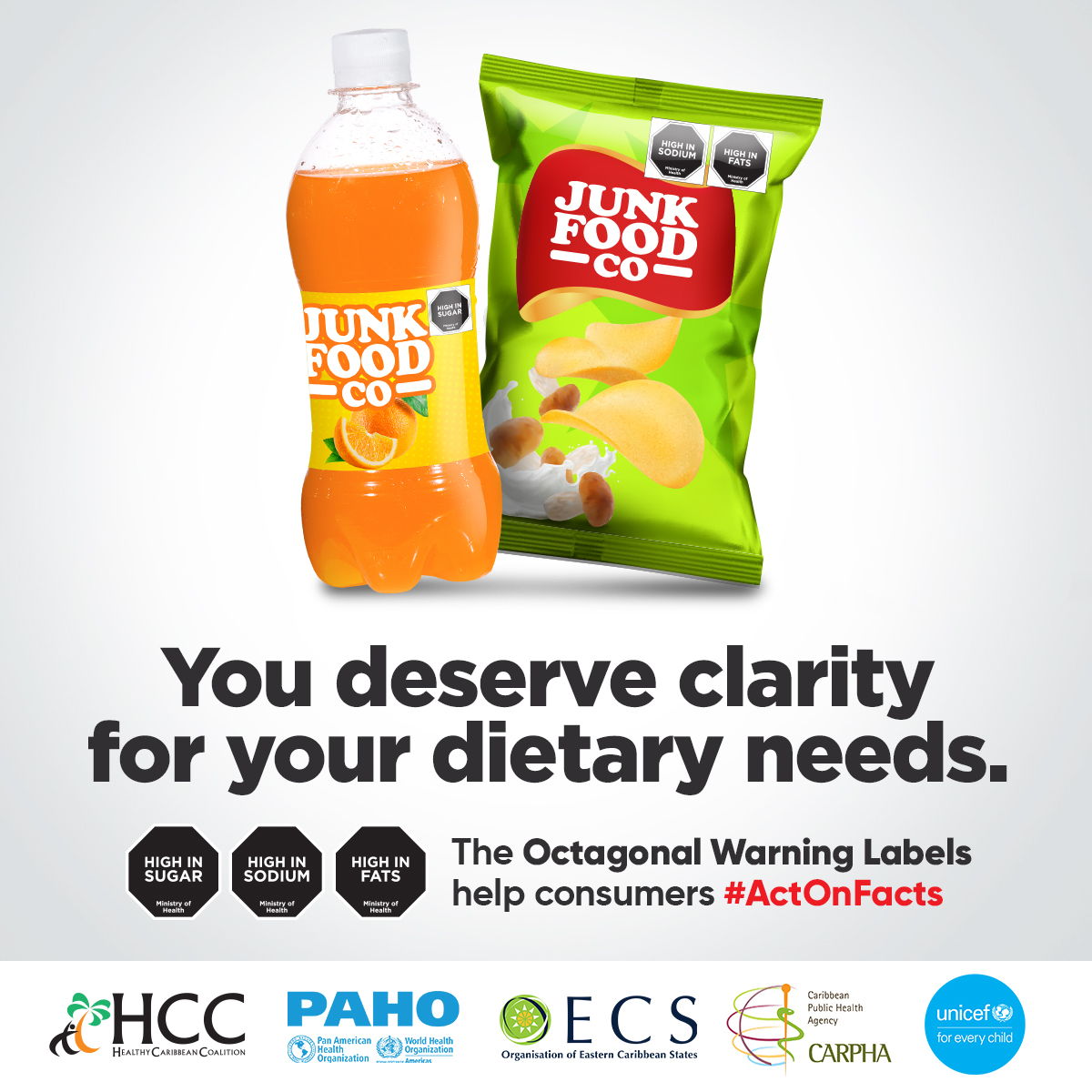CARICOM Urged to #ActOnFacts and Vote for Octagonal Front of Package Warning Labels
Joint Media Release
For a healthier Caribbean, adopting Octagonal Front-of-Pack Warning Labels (OWLs) is crucial. These labels, which explicitly flag foods high in sugar, fat and salt, could be instrumental in addressing obesity and other diet-related non-communicable diseases (NCDs).
This perspective was highlighted in a virtual webinar held on 4 October, titled ‘What is Happening with Food Labels in CARICOM? The Role of Octagonal Warning Labels in Transforming the Health Landscape’, organised by the Healthy Caribbean Coalition (HCC). The webinar is an integral part of the 'Octagonal Warning Labels help Consumers #ActOnFacts' four-week social media campaign to amplify public awareness and obtain policymaker support for OWLs. Research from Barbados and Jamaica highlights the potency of these labels in addressing NCDs, which are currently the leading cause of death, illness and disability in the Caribbean. Concurrently, CARICOM Member States are considering the integration of OWLs proposed within the Final Draft of the CARICOM Regional Standard for the Labelling of Prepackaged Foods (FDCRS 5).
The event featured lively discussion among experts from intergovernmental bodies, regional health institutions, civil society and academia. The HCC showcased its unwavering regional advocacy for the FDCR5. The regional campaign also includes a petition which currently has over 700 signatories including, notably, public health professionals and academics and over 45 regional organisations endorsing the octagonal warning label. Further solidifying this support, an Open Letter urging support for the FDCRS 5 - signed by HCC Patron, Sir George Alleyne, campaign partners, Chairs of National NCD Commissions including Barbados, Jamaica and Barbados and regional CSOs - will be shared with CARICOM National Standards Bodies.
Panelists dispelled the argument that OWLs have an adverse effect on trade and the economy. Ms. Nicole Foster, Deputy Dean, Faculty of Law and Head Law and Health Research Unit, UWI Cave Hill and HCC Policy Advisor, addressed concerns by some private sector actors who oppose the octagonal warning labelling – reiterating that OWLs is a public health measure and not a barrier to trade. Dr. Fabio Gomes, Regional Advisor in Nutrition, Pan American Health Organization (PAHO), presented compelling evidence from studies conducted in Jamaica showing how OWLs is the most effective labelling system for helping consumers identify unhealthy foods. He also shared findings from a study in Barbados which discovered OWL's potential to avert 16 per cent of NCD deaths and save its government $732 USD million per year in mortality costs.
“With science on our side, at PAHO, we continue to encourage governments and heads of state to prioritise policies that support healthier environments,” said Dr. Anselm Hennis, Director of PAHO’s Department of NCDs and Mental Health. He highlighted the serious threat NCDs pose to sustainable economic development, particularly in Small Island Developing States. “This continues to be reaffirmed by our ministers of health from the Caribbean, who have once again made a call to action through the newly signed 2023 Bridgetown Declaration on NCDs and Mental Health,” Dr. Hennis added.
According to Dr. Joy St. John, Executive Director of the Caribbean Public Health Agency (CARPHA), “Research in the Caribbean has shown that Front of Package Warning Labels (FOPWL) such as octagonal front-of-package warning labels constitute the best performing system to help consumers correctly and easily identify products that contain excessive amounts of sugar, sodium, trans-fats, and fats. FOPWL will transform how we view the foods we consume.”
Sir Trevor Hassell, President of the HCC, emphasised, “Octagonal Warning Labels support healthy school nutrition policies, aid the perception of sugar sweetened beverages as a health risk, encourage reformulation to healthier products, and support nutritional guidelines.”
Meanwhile, Dr. Didacus Jules, Director General of the Organisation of Eastern Caribbean States (OECS), remarked, "Octagonal Warning Labelling is a critical initiative that must be actioned…Consumer awareness can empower buyers to make intelligent, healthy choices about what they eat. This can benefit Caribbean manufacturers by opening up new trade opportunities for tropical products that respond to the growing global consciousness and choice for healthy foods."
The importance of the labelling is clear to UNICEF’s Representative for the Eastern Caribbean Area, Pieter Bult. “We are proud to be a part of the ‘Octagonal Warning Labels help consumers #ActOnFacts’ campaign,” he said, adding, “We need to do more for our children. Alongside other interventions – such as promoting healthy school nutrition policies and increased physical activity – adopting warning labels can make a profound difference to the lives and health of our children. Let’s give them that chance.”
Ms. Xarriah Nicholls, a member of the HCC Persons Living with NCDs Advisory Committee and Healthy Caribbean Youth, shared how OWLs would help her make healthier dietary choices as a young person living with diabetes. She emphasised that everyone, including persons living with NCDs deserve the best labels to make healthy choices that will ultimately improve lives.
The event was held in collaboration with PAHO, the OECS Commission, CARPHA, the Caribbean Public Health Law Forum and UNICEF.







